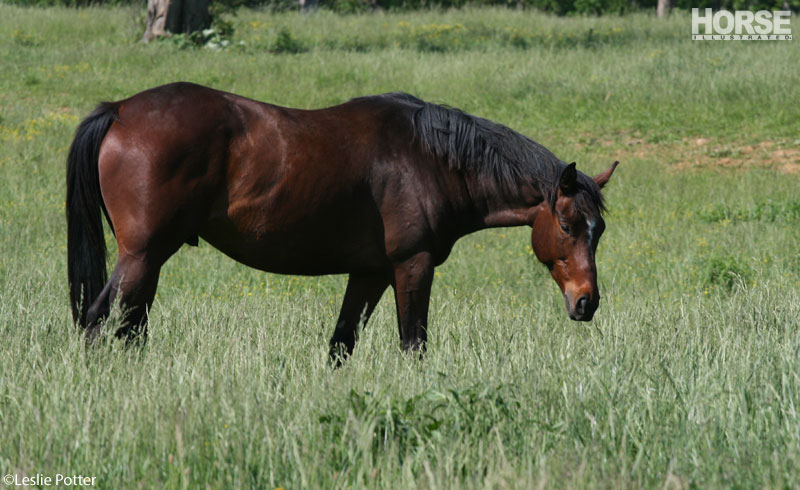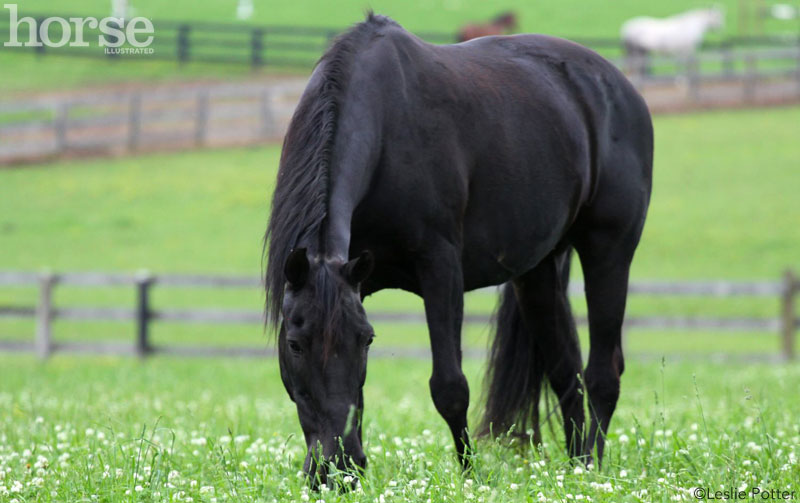There’s an old adage among longtime horse owners: Eventually all horses go lame. Fortunately, most lamenesses are short-lived, and the horse recovers. But what are your options when your horse becomes permanently unsound? Whether a chronic condition has advanced to a severe disability, or your horse suffers a catastrophic injury, a lame yet otherwise healthy horse presents a heartbreaking dilemma. You must ask yourself the following:

- If my horse is limping or displaying signs of restricted movement, he’s in pain, so it’s inhumane to ride him in this condition. My first priority is to determine what’s best for my horse. If I decide I can’t ride him, do any of my friends have a horse I can borrow for an occasional ride? Does my riding instructor have a lesson horse that needs exercise? Can I volunteer to school horses at a local rescue operation?
- Does my vet have medications or a management plan that might reduce my horse’s pain so he’s at least pasture sound? If so, can I afford to care for a “pasture pet” until the end of his natural life?
- If indeed my horse can be made pasture sound, is my horse one of those trustworthy babysitters with impeccable ground manners? Do I personally know anyone who might want a sweet backyard horse that can serve to introduce young children to the world of horses? They’ll have to sign a contract, however, ensuring that the horse comes directly back to me if they ever want to terminate the agreement.
- Am I willing to haul my horse to a major equine veterinary hospital or university? Advanced diagnostic procedures are available on-site, plus I’d get a second opinion and access to innovative treatments. Yet I could end up with a hefty bill in exchange for just more bad news.
- What is my horse’s quality of life? Now that his routine is permanently altered, and he must endure some amount of pain each day, I feel like I’m prolonging his suffering rather than preserving his life. Is it ethically alright for me to consider humane euthanasia?
The short answer to the final consideration for a horse living in pain is “yes.” Once you’ve received a confirmed diagnosis from your equine veterinarian, and you’ve explored treatment and maintenance suggestions, humane euthanasia may be the most ethical choice for the permanently lame, unrideable horse. It’s far better than some of the other options.
For example, some horse owners can’t emotionally deal with the idea of putting down one of their horses. They choose to live in blissful denial. They ignore the raw sores from hours spent lying down to relieve the pain in hooves and joints. They disregard their horse’s listless demeanor as it hobbles toward its dinner. Another example of denial is sending a lame horse to an auction, with the fairy tale notion that a kindhearted stranger will buy the horse for a few dollars. Of course, in reality that once beloved horse is probably going from the auction to a slaughterhouse.
A horse owner who can afford monthly board and care fees might consider sending their pasture sound horse to a retirement facility. Many of these retirement homes provide loving, expert care for pensioned equines. On the other hand, personal anecdotes abound regarding long-distance horse owners who make an impromptu visit and discover their disabled horse in deplorable condition. It’s wise to conduct a thorough investigation of such facilities before shipping a lame horse into oblivion.
If you’re ever faced with the diagnosis of a severely lame, unrideable horse, find the courage to confront all aspects of the situation. Set your emotions aside and focus on your horse’s comfort and quality of life. You’ve always done what’s best for your horse; don’t stop now, when your wisdom and compassion are most needed.
Liked this article? Here are others you’ll enjoy:
When is it Time to Retire Your Horse?
Senior Horse Retirement
Pain Management for Horses




The hardest thing, I had to do was to put down one of my mares, she was 26, and born on my farm, but broke her back leg as a baby, and the last couple of winters were very hard on her.
Very good points.
I have owned and loved animals including my horses most of my life. I feel a great responsibility for their welfare as they are completely dependent on my decisions. I firmly believe euthanasia is fairest and kindest choice and I have made those decisions for my animals. The article is very good on this point. Once an animal leaves your care, they become a victim of the whims of another person who doesn’t have the vested interest you do.
My horse became lame about 5 years ago. He is managing with little pain, just a limp. Being the best, most loyal horse in the world he is retired with honors. Lots of brushing, love, treats, holding him remembering the rides we shared. You don’t throw away your best friend, or else you put him to sleep with dignity.
IT DEPENDS ON WHAT KIND OF INJURY THE horse has because we have two mare that can not be rode but they get around fine one has a bone spur and it is nonfixable the other had cut her foot under the fetlock but she does really great and they are not going anywhere them slaughter people make me sick my thought is maybe they are to get a taste of what they hand out. thats all i will so its up to the owner and the damage the horse has we have had to put down three of our and buried them out in the pasture at least they died with dignity.
I have owned my 23-yr-old QH, Tuck,The Painting Horse of The West for 20 years. Five years ago he was diagnosed with degenerative suspensory ligaments in his hind legs. He loves life and I could not see euthanasia just because he could no longer be ridden. Since that time he has been very comfortable on Previcox. And, started painting this year in April and that gave him his third career. Tuck is eager to paint; he love it! When his pain can no longer be managed with mediation, then I will not let him endure it. He will tell me when he is ready to leave me.
Three weeks ago I euthanized my 19 year old Appaloosa gelding. We spent 7 months trying medications and procedures to relieve the pain in the front left pastern, it was not controllable. Putting my horse down was one of the hardest decisions I have ever made. However, as with all animals that count on us, I took on the responsibility of “end of life” decisions when I got him and it would not have been fair to allow him to live on in pain. I amde a responsible decision.
I have a permanently unrideable horse but wouldnt be without him. He goes on in hand walks when he can and enjoys being thoroughly spoilt. I have horses for their character not just to ride.
Good article.
Looking at the comments, I think I’m seeing the assumption that unridable means lame… and it could.
There are a variety of reasons for “unridable” – that might have more to do with the unrider than the horse – at least it does in my case.
My mare is sound and probably ridable, but I’m not. However I signed in to note that there’s a great book called “The Smart Woman’s Guide to Midlife Horses” that looks at a lot of options around “the horse life” beyond riding.
I would love to ride and will again someday – meanwhile I work with my mare on the ground and she is a good “private therapy horse!” for me.
Her buddy, a 32 year old Arabian gelding, went down in a snow storm and given his chronic conditions and the fact that he would suffer greatly even if we could get him up – I had the vet put him down humanely. And it is the only time I never felt terrible about such a thing. It was right for the situation and saved him from a long winter of suffering.
But for the horse who just is fragile but not in chronic pain, there are many options, from learning ground work at the walk, “going for a stroll” with a canteen on her saddle, pasture pet, pasture buddy for another horse… you name it.
Alas, the horse rescue biz is booming these days, so my interest is in supporting good quality rescues as a volunteer (grant writer, micro donor, what have you.) But I love my mare, and am happy she’s in no pain.
I enjoyed the different reasons. I had a horse that couldn’t be ridden & fortunately I was able to take care of her until she passed at 34. It’s a hard decision, but it all comes down to how the horse is feeling & nothing more can be done for it. In that case I would put it down, that way I know where she is & not at some feedlot.
I’m going through this with my beloved paint. He suffered and injury 2 years ago and is chronically lame on his hand end. My vet has seen me fight this battle for awhile now. He is 10 and I’ve had him since he was a baby. He has been there for me through thick and thin. I can’t watch him suffer anymore he is so stoic and wants to please even though he is in terrible pain. It’s just not fair to him to suffer.